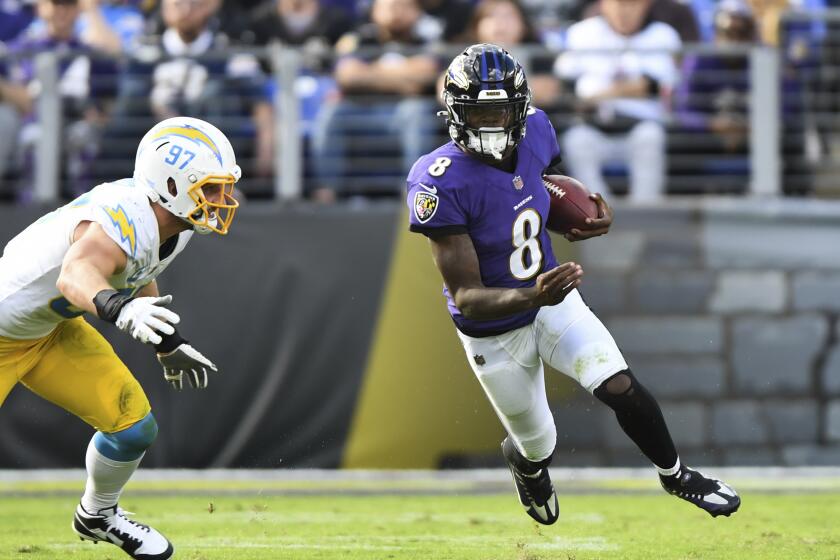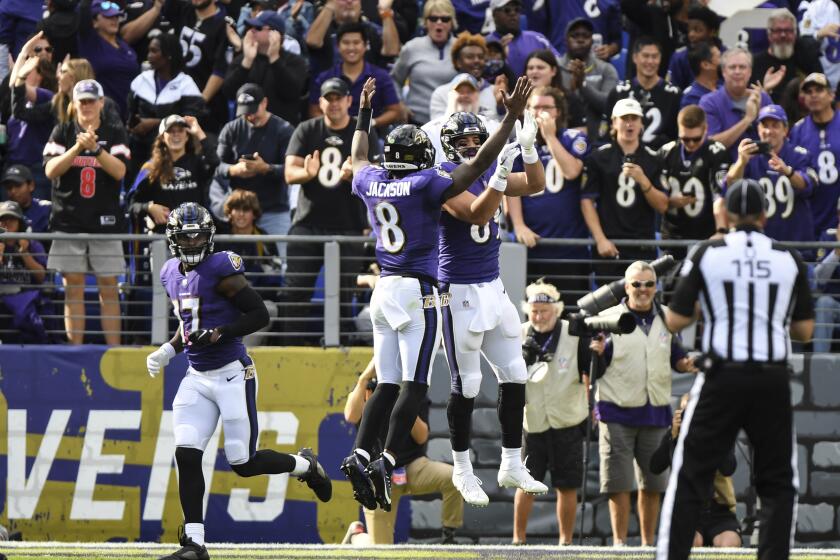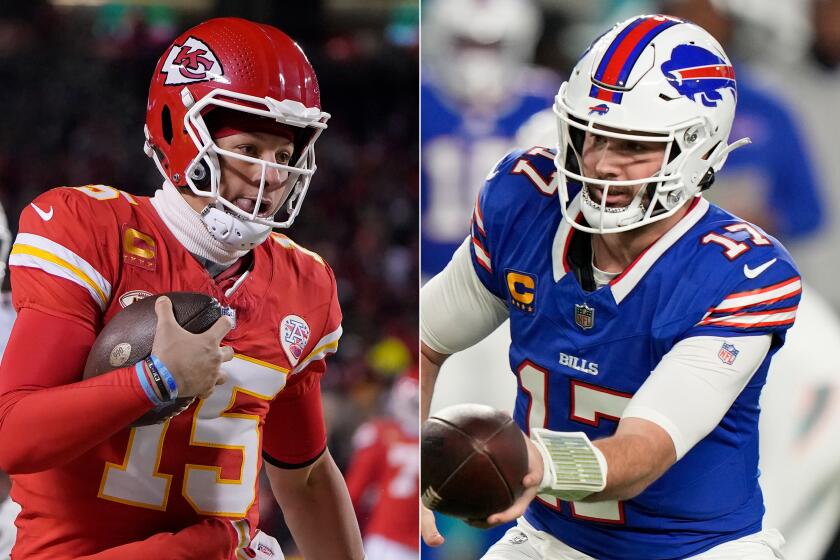What we learned from Chargers’ 34-6 road loss to Ravens: Risks don’t always pay
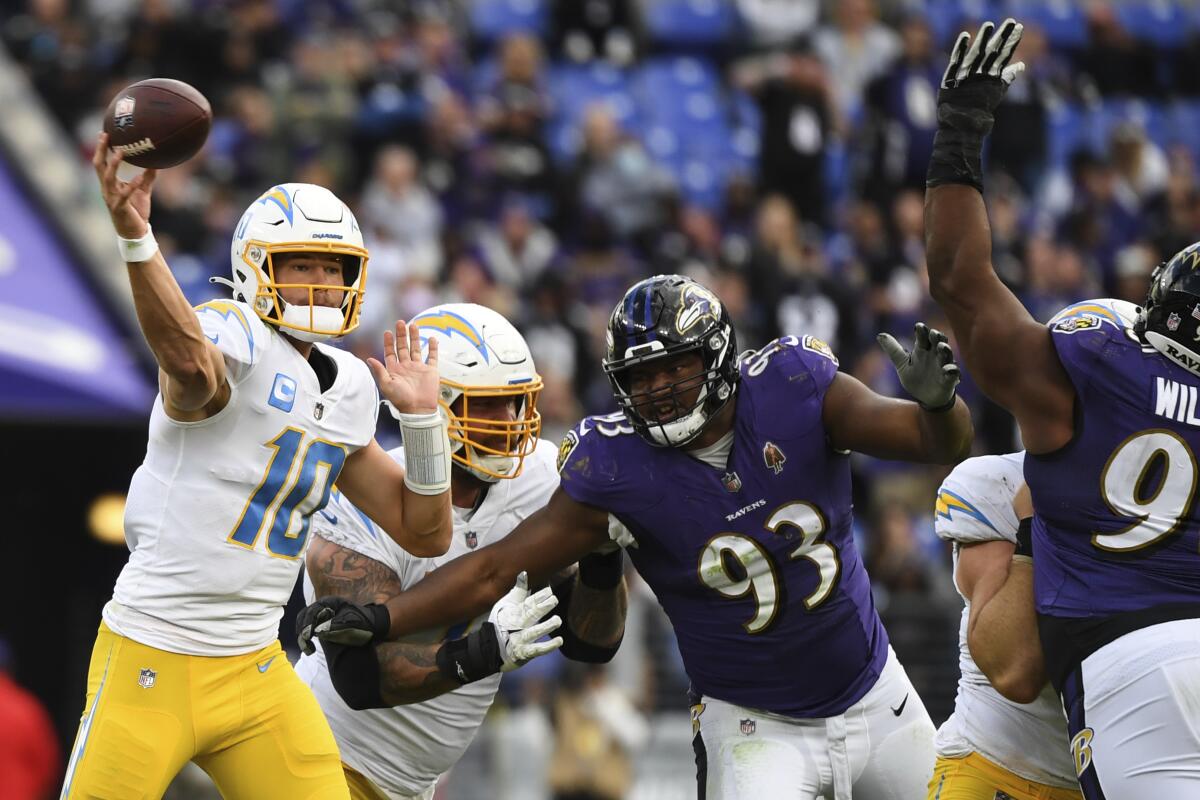
- Share via
After opening the season with four wins in five games, the Chargers landed with a thud Sunday, falling 34-6.
Here are some takeaways from their loss to Baltimore:
Fourth-down frustration: The Chargers’ offense was successful on its first seven fourth-down tries to open the season. That perfection died Sunday.
The group finished one of four, twice failing to convert in its territory when the outcome of the game was still undecided.
Approaching the midway point of the second quarter and down 14-0, the Chargers had fourth and three at their 39-yard line. Justin Herbert passed incomplete to Mike Williams.
In the final six minutes of the third quarter and trailing 24-6, Herbert misfired to Joshua Palmer on fourth and one at the Chargers’ 19. Both failures led to field goals by the Ravens’ Justin Tucker.
The second try was the more glaring because of the field position and the fact Herbert attempted to go to a rookie wide receiver who entered Sunday with five career receptions.
The Chargers realize their 34-6 loss to the Baltimore Ravens isn’t the end of the world, but the team now realizes they have a lot of work ahead of them.
“I’m always gonna trust Justin’s judgment,” coach Brandon Staley said. “We got to make sure that we’re physical on the outside and that we’re strong with the ball and our ball location’s where it needs to be.”
Staley admitted the latter decision was motivated somewhat by the need to jump-start an ailing offense.
“Yeah, we needed to get something going,” he said. “That wasn’t the entire motivation but certainly part of it. ... We were just a little bit off. Give credit to them because they earned it.”
Kicker questions won’t go away: The struggles of Tristan Vizcaino continued when the rookie missed an extra-point attempt, his fifth of the season.
“It’s a concern …” Staley said. “I just want to make sure that we go back and we really attack the fundamentals.”
Staley said Vizcaino looked good in practice last week. The Chargers have praised his strong leg and kickoff ability, but Vizcaino is just 10 of 15 on extra-point attempts. He has made six of seven field-goal attempts.
“So much of this game is confidence,” Staley said. “I think that’s where we’re at with him, just establishing his confidence and his rhythm. … He’s got the right stuff mentally. We need him to bounce back.”
Cornerback shuffle: Tevaughn Campbell replaced starting cornerback Michael Davis twice Sunday, a move that Staley said was “part of the game plan” and will continue to be.
A former CFL player who was born in Toronto, Campbell is in his second NFL season.
The Chargers gave Davis, a former undrafted free agent, a three-year contract worth up to $25.2 million in March.
“T.C.’s earned an opportunity,” Staley said. “He gives us something out there. We feel like a rotation between Asante [Samuel Jr.], Mike and Tevaughn is healthy for our team. That was the motive, and we’re going to continue to do that as the season goes on.”
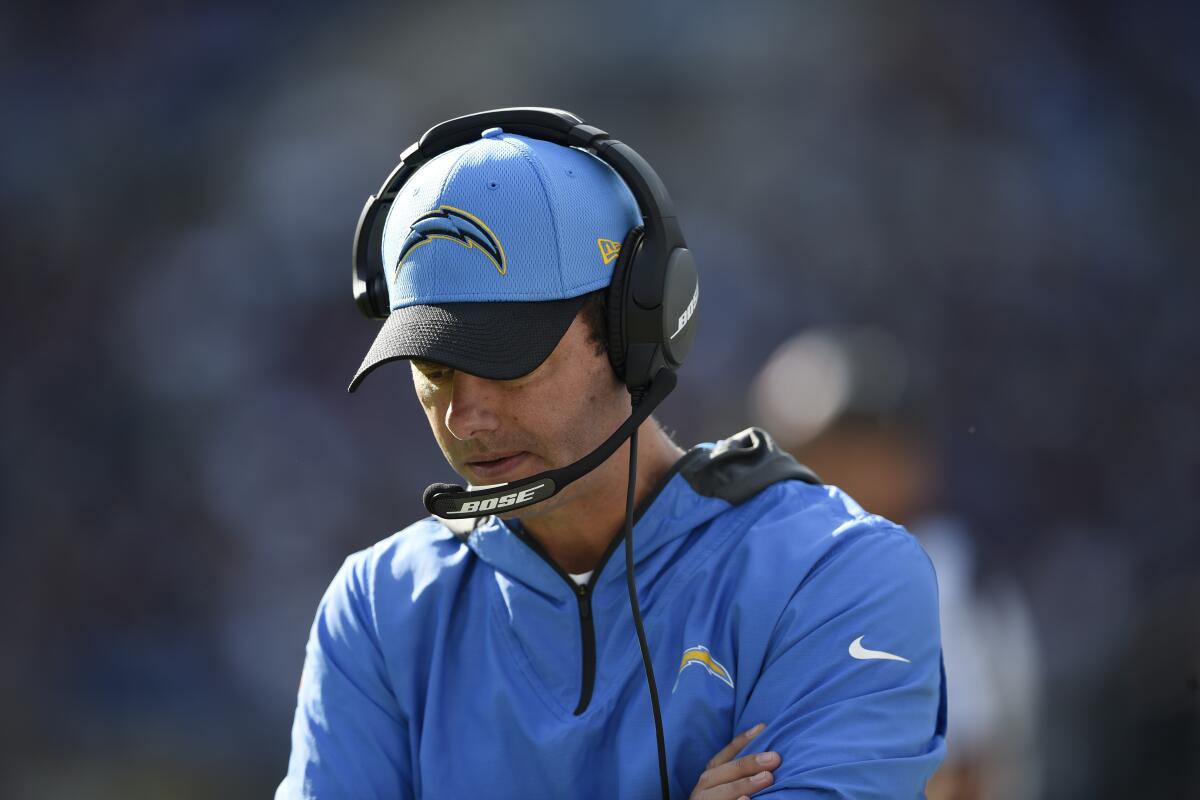
QB’s rocky day: Herbert finished with the second-lowest single-game quarterback rating of his career at 67.8. He was 22 of 39 for 195 yards, with one touchdown and one interception.
The yardage total and completion percentage (56.4) also were his second-lowest totals.
Still, Staley praised Herbert, given all the circumstances.
“In a game like that, where it gets away from you a little bit, I think you can tell a lot about your quarterback,” Staley said. “I thought he was strong with the ball. I thought he took care of it. I really liked the pass that he threw Jared [Cook] on the interception. I thought it was really good ball location. I thought he was strong. The pockets were tight. There was a lot of pressure.”
Herbert was sacked twice and hit two other times. The interception came in the second quarter when Baltimore safety DeShon Elliott wrestled the ball away from Cook.
“I thought the defender made a good play on it,” Herbert said. “I have to be smarter and keep going through my reads and find the completion instead of forcing it down the field. But I thought the defender made a good play on it.”
Kicking game woes, part 2: Coupled with Vizcaino, the Chargers’ special teams as a whole did not have a great day.
Trailing 17-6 at halftime, the Chargers needed a stop to open the second half and attempt to gain some momentum. Instead, Baltimore’s Devin Duvernay returned the kickoff to start the third quarter 47 yards.
Breaking down the notable numbers behind the Chargers’ 34-6 loss at the Baltimore Ravens on Sunday — scoring and statistics.
The Ravens then went 52 yards in 12 plays for a touchdown, with Mark Andrews catching a nine-yard scoring pass from Lamar Jackson.
“You don’t want to defend that quarterback on a short field,” Staley said. “You don’t want to defend that kicker on the short field. So our coverage units weren’t good enough today.”
Pounded on the ground: Entering Sunday with the NFL’s worst run defense, the Chargers again were pushed around far too often.
Baltimore rushed for 92 yards in its first two drives, both of which netted touchdowns. The Ravens finished with 187 yards in 38 rushes, that effort leading to their wide edge in time of possession.
“At times, we played well,” Staley said. “At times, we were a little uneven.”
More to Read
Go beyond the scoreboard
Get the latest on L.A.'s teams in the daily Sports Report newsletter.
You may occasionally receive promotional content from the Los Angeles Times.

